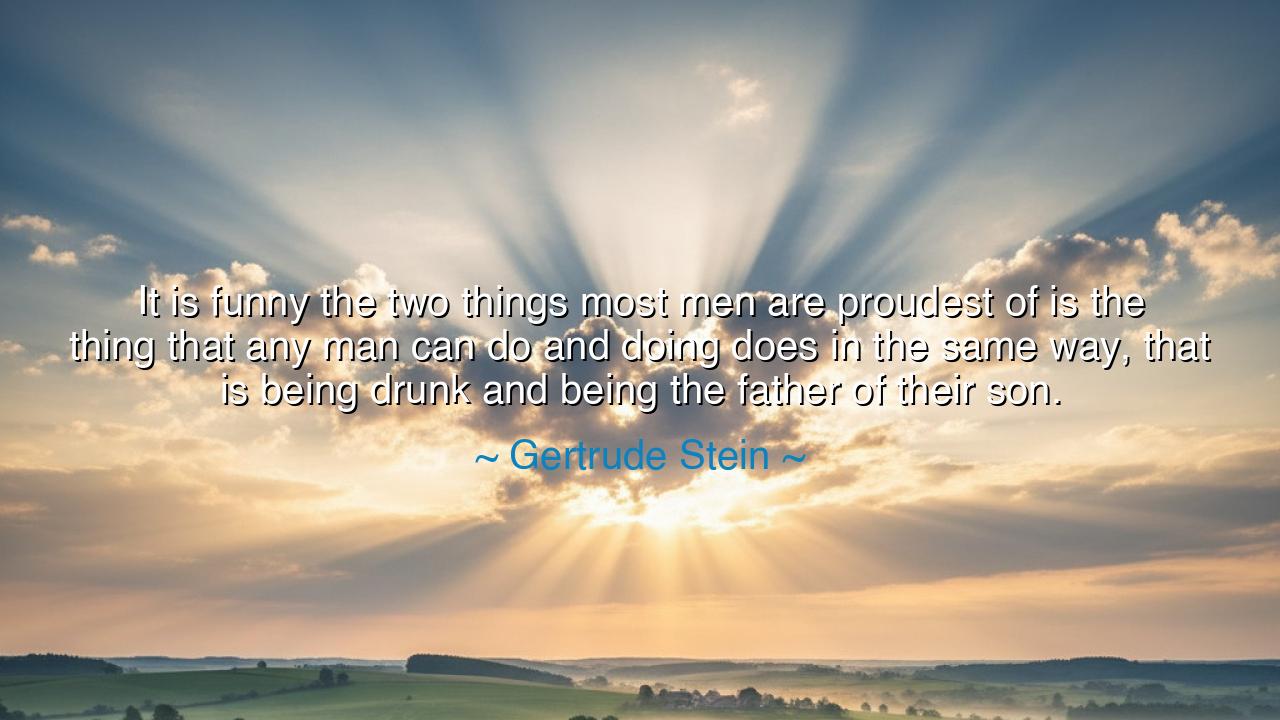
It is funny the two things most men are proudest of is the thing
It is funny the two things most men are proudest of is the thing that any man can do and doing does in the same way, that is being drunk and being the father of their son.






The words of Gertrude Stein—“It is funny the two things most men are proudest of is the thing that any man can do and doing does in the same way, that is being drunk and being the father of their son.”—are as sharp as they are profound. Beneath her wry humour lies a piercing reflection on human vanity, the tendency of people to exalt the ordinary as if it were rare. Stein, ever the observer of the inner mechanics of the human soul, unveils the paradox of pride: that it often anchors itself not in true creation or virtue, but in what is most common and unexamined. Her tone is ironic, yet compassionate, for she understands that the human need for meaning drives even the smallest of boasts.
When she says it is “funny,” she does not mean it as laughter for amusement, but as irony—an observation of the absurdity of life. The things “most men are proudest of,” she notes, are neither noble achievements nor unique acts of greatness, but impulses and outcomes shared by all. To be drunk and to father a son—these are acts governed by nature and instinct, not by discipline or wisdom. Yet men cloak them in the garments of pride, declaring them proofs of manhood. Stein’s observation pierces through that illusion, asking: why do we cling so tightly to what requires no mastery? Why do we mistake the accidents of existence for the fruits of intention?
The origin of Stein’s insight lies in her world—a world of modernity, where society was shifting, questioning what it meant to be male, female, human, or artist. She lived among thinkers who believed progress meant self-awareness, and yet she saw that pride often hides ignorance. The same men who built empires or shaped politics still boasted of drink and offspring as though these were their highest callings. In her eyes, this pride was not evil, but tragic—a symbol of humanity’s inability to distinguish between the inherited and the achieved, between what life gives freely and what must be earned through growth.
The ancients knew this folly well. The philosopher Diogenes, when asked why he mocked the powerful, said that most men are proud of the wrong things. He pointed to kings who gloried in wealth, soldiers who gloried in killing, and fathers who gloried in lineage rather than virtue. “The only thing worth pride,” he said, “is the self made free.” Like Stein, Diogenes saw that man’s pride often rises not from his spirit, but from his animal nature—from what requires no wisdom, only impulse. To beget life is no miracle of character; to govern it wisely is. To drink is no achievement; to think clearly despite temptation is.
Yet Stein’s words carry not condemnation, but insight. In exposing the absurd, she invites awakening. There is something deeply human in the male pride she describes—a yearning to feel significant, to belong to the lineage of creation. The tragedy is not that men boast of small things, but that they forget to strive for greater ones. Her irony becomes a mirror in which we see our own misplaced glory. How often do we mistake luck for talent, possession for creation, or instinct for purpose? In laughing at men’s pride, she laughs at all of us, for the same folly lies within every human heart.
Consider the example of Alexander the Great. History remembers him as a conqueror of worlds, yet even he fell into the same vanity Stein describes. After building an empire, he wept because there were no more worlds to conquer—blind to the truth that conquest itself, like drunkenness or fatherhood, is not wisdom but impulse magnified. His pride, like that of all men, was rooted not in enlightenment but in desire. It is a reminder that true greatness lies not in what we possess or produce, but in how deeply we understand ourselves.
From Stein’s reflection, we draw a lesson of humility. Be wary of pride that rests on what is effortless. The act of drinking is not joy; it is escape. The act of procreation is not legacy; it is beginning. To be truly proud, one must build upon these foundations—transform instinct into intention, flesh into spirit, inheritance into creation. Let your pride come from consciousness, not impulse; from character, not circumstance.
So, my friends, remember this teaching: do not mistake the ordinary for the exceptional. The body’s impulses are universal; it is the mind and heart that make them divine. Laugh gently, as Gertrude Stein did, at the vanity of humankind—but then rise above it. Be not proud of what life gives freely, but of what you forge with effort, compassion, and wisdom. For the true measure of a person is not in what he can do by nature, but in what he can do by choice. And when your pride is rooted in creation of the soul, not indulgence of the self, then your life will no longer be a comedy of the ordinary—but a testament to the extraordinary.






AAdministratorAdministrator
Welcome, honored guests. Please leave a comment, we will respond soon